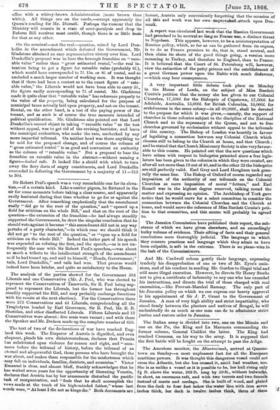On the nominal—not the real—question, raised by Lord Dun- kellin
in the amendment which defeated the Government, Mr. Gladstone obtained an easy argumentative victory over him. Lord Dunkellin's proposal was to base the borough franchise on "rate- able value" rather than "gross estimated rental,"—the real in.. tention being to get a figure for rateable value (probably 61.), which would have corresponded to 71. 15s. or 8/. of rental, and so excluded a much larger number of working men. It was thought that if there had been a contest as to the exact figure of "rate- able value," the Liberals would not have been able to carry 5/., the figure really corresponding to 71. of rental. Mr. Gladstone made it quite clear that "rateable value" has reference properly to the value of the property, being calculated for the purpose of municipal taxes actually laid upon property, and not on the tenant. Rental, on the other hand, is a test of the paying power of the tenant, and as such is of course the true measure intended of political qualification. Mr. Gladstone also pointed out that Lord Dunkellin's second object in taking "rateable value" as the test without appeal, was to get rid of the revising barrister, and leave the municipal authorities, who make the rate, unchecked by any more impartial tribunal. On neither head was there anything to be said for the proposed ehaege, and of course the column of "gross estimated rental" is as good and convenient an authority as the column of "rateable value." But a proposal to base the franchise on rateable value in the abstract—without naming a figure—looked safe. It looked like a shield with which to turn away the fiery darts of angry constituents, and Lord Dunkellin succeeded in defeating the Government by a majority of 11-315 to 304.






























 Previous page
Previous page